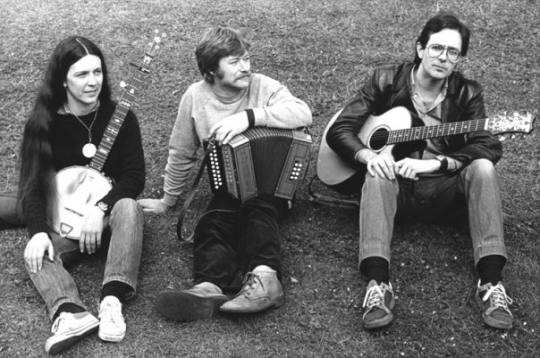|
By the late 1960s I was already quite a fan of American and Irish folk music, dabbling with it on the guitar between bouts in rock bands, as well as collecting recordings from far flung places. A friend in high school led me to Francis James Child's books of collected tunes and ballads, and the Topic Records collections of truly English folk music furthered my addiction. We also both took a shine to the accordions, melodeons and concertinas we heard, although neither of us were worth a damn as players. My collecting habit had me trading LPs with many people in Europe, including one astute fellow in England who turned me on to folks like Dolly and Shirley Collins, The Copper Family, Pentangle, the various Watersons and Carthys, as well as the lot of newly rising folk and folk-rock bands.
Among those ensembles were Oak, The Old Swan Band, Phoenix, and later The English Country Blues Band (pictured above), Edward II & The Red Hot Polkas, and Tiger Moth. While I was not one to pay attention to who played what in those days, one common thread was melodeon player Rod Stradling, whose robust approach to the instrument always seemed to guide the sound of these bands in various ways. It was only with the release of Stradling's 1991 solo effort, Rhythms of the Wold that I became more familiar with the musician himself.

|
|
So in this collection we have the Stradling history, potted nicely by fellow musician and editor of the late fRoots Magazine, Ian Anderson. It's a bountiful helping of straight ahead dance music like “The Sloe” by The Old Swan Band, Oak's “Scan's Polkas Nos 1 & 2” and solo masterpieces like “The Trip We Took Over The Mountains” that slides into a very English version of the Italian tune “Pive.” As Anderson points out in his notes, “Regardless of source, everything Rod played would now come out sounding English.”

|
|
Then, there are the more electric folk tunes like Tiger Moth's “The Digital Watch” and “Speed The Plough.” Electric guitars, bass and drums are added, but the music is still designed for dancing, albeit with the occasional twist to give a dancer pause. If there is a modern favorite among the 21 tracks here, it's probably Edward II & The Red Hot Polkas' “Bourée a Gaston Tommier,” with its hints at contemporary production, a quirky bass line, a host of hot guitar licks, and a number of musicians named Stradling.
The whole package is a delight. It's programmed for the love of the music, not chronologically, so the variety is evident throughout. Stradling wrote notes for each track, with a bit of story telling to keep you close to the history. So if you have not already, come meet Rod Stradling and enjoy some Treacle & Bread.
Photo courtesy of Ian Anderson
Further reading:
In addition to playing his melodeon, Rod Stradling also edits and publishes a treasure trove of articles and reviews in his online magazine, Musical Traditions. It includes a 2003 piece with "Everything you need to know about melodeons."
|
